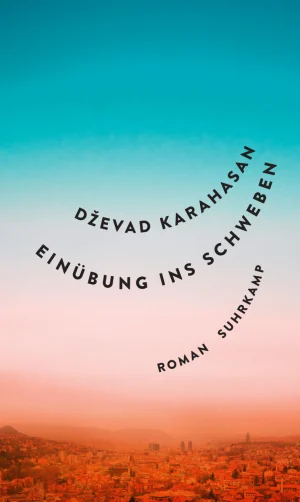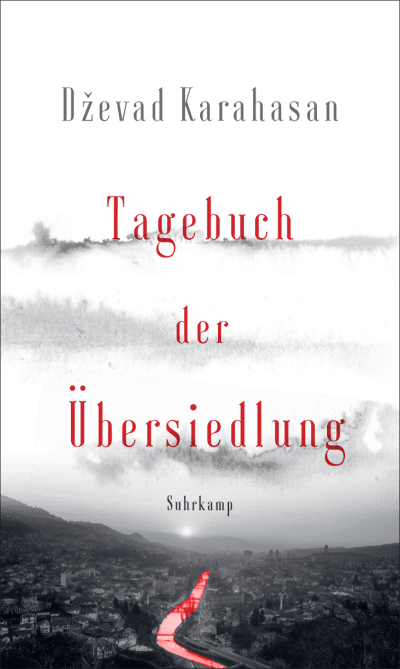Diary of an Exodus
Italy (ADV)
Previously published in the respective language / territory; rights available again: USA & Canada (Kodansha America), Spanish world rights (Circulo de Lectores / Galaxia Gutenberg), France (Calmann-Lévy), Netherlands (Van Gennep), Czech Republic (Mlada Fronta), Slovenia (Wieser)
A permanent testimony to humaneness in dark times
»White with fear and sleeplessness we set out to see what was left of Marijin Dvor.« Once more they have been spared: a piece of shrapnel missed the author and his wife and hit the books instead: William Faulkner, Nadezhda Mandelstam, Gottfried Keller’s Green Henry. Dževad Karahasan describes life in besieged Sarajevo in short, unforgettable scenes.
A man who steps out of the queue, sits down on a low wall and dies. The evacuation of the Jewish community. The absurd...
»White with fear and sleeplessness we set out to see what was left of Marijin Dvor.« Once more they have been spared: a piece of shrapnel missed the author and his wife and hit the books instead: William Faulkner, Nadezhda Mandelstam, Gottfried Keller’s Green Henry. Dževad Karahasan describes life in besieged Sarajevo in short, unforgettable scenes.
A man who steps out of the queue, sits down on a low wall and dies. The evacuation of the Jewish community. The absurd conversation about the hunger and the cold with a French correspondent. Sarcasm, humour, kindness and an impressive intellectual confidence characterise the attitude with which Karahasan writes about everyday life during a war and about the migration of a culturally and religiously polyphonic city into the sphere of the ideal.
The Diary of an Exodus is a permanent testimony of the Siege of Sarajevo – less in the way it documents everyday life but in its intellectual and ethical charisma.
»And thus the Sarajevo from before the siege of the Bosnian Serbs and the invasion by tourists has been relocated to an ideal sphere that can only be reached through literature, […] through this Diary of an Exodus.« Tobias Lehmkuhl, Süddeutsche Zeitung
»Reading Karahasan again is more topical than ever in this age of supposedly cemented identities.« Marko Martin, DIE WELT
»His extensive learnedness, his ability to make at least three unexpected, inspiring cross-connections to every topic, and his analytical gaze are apparent on every single one of the nearly two hundred pages.« Freie Presse
»His books are absolutely contemporary and cunningly ageless at the same time.« Deutschlandradio Kultur
»He is one of the great European scholars of our times […] A book that one should have read to understand Europe’s most recent, painful history.« ORF
»Dževad Karahasan ... is the most important chronicler of this siege, in which around 14,000 people died, and one of the most important writers of the former Yugoslavia.« SR2
»I would find it difficult to name my favourite book by Dževad Karahasan … why not Reports from a Dark World or the incomparable Diary of an Exodus?« Ingo Schulze in his laudatory speech, Goethe Prize 2020
»Readers let Dževad Karahasan take them by the hand with great pleasure. The Bosnian novelist and essayist, who grew up with the Quran, well-versed in Goethe and Georg Büchner, appears as a welcome pilot amidst the perils of West-East misunderstandings.« Ilma Rakusa, Neue Zürcher Zeitung
»And thus the Sarajevo from before the siege of...
Persons
Dževad Karahasan
Dževad Karahasan, born in Duvno/Yugoslavia in 1953, was an author, playwright and essayist. The Siege of Sarajevo is the subject of Dnevnik selidbe (1993), translated into ten languages, of the essay collection entitled Knjiga vrtova (2004) as well as of his novels Šahrijarov prsten (1997) and Sara i Serafina (2000). His works also include the novel Noćno vijeće (2006), Izvjestaji iz tamnog vilajeta (2007), a collection of stories, and Die Schatten der Städte (2010), a collection of essays. Karahasan has received numerous awards, including the Goethe Prize 2020. Dževad Karahasan died on May 19, 2023, in Graz, Austria.
Dževad Karahasan, born in Duvno/Yugoslavia in 1953, was an author, playwright and essayist. The Siege of Sarajevo is the subject of Dnevnik...
OTHER PUBLICATIONS

Introduction to Floating
Peter Hurd, classical philologist and mythologist, comes to Sarajevo for a reading – just a few days before the war begins. When his translator and admirer Rajko takes him to the bus station to...
Italy (Keller Editore)

A House for the Wearied
Sarajevo, September 1914. In a newspaper editorial office, at the national bank and in other official locations, letters arrive with considerable delay, often years later. Yet it is not the war...
Italy (Keller Editore), Turkey (Ketebe)

The Solace of the Night Sky
In Isfahan, capital of the Seljuq Empire, a highly respected man dies unexpectedly. The son of the deceased demands an investigation into the circumstances of his father’s death. Court...
Chinese simplex rights (Shanghai Translation Publishing House), Bulgaria (Paradox), Slovenia (Beletrina), Turkey (Iletisim), Part 1: Macedonia (Templum)

The Shadows of Cities
The great Bosnian writer and essayist Dževad Karahasan, rooted in the literary traditions of antiquity and of the Islamic and Christian world, has an understanding of the craft...

Reports from a Dark World
Poland (Borderland), Bulgaria (Paradox)

Night Council
English world rights (Anubih), Bulgaria (Paradox), Slovenia (Cankarjeva Založba), Turkey (Apollon)

The Book of Gardens

Sara and Serafina
A young couple is supposed to be smuggled out of the besieged city of Sarajevo with forged baptism documents. The plan fails. The participating rescuers are tormented by guilt. Serafina,...
Arabic world rights (Alaan)
Previously published in the respective language / territory; rights available again: Spanish world rights (Galaxia Gutenberg), France (Laffont), Italy (Il Saggiatore), Sweden (Bosnisk-Hercegovinska Riksförbundet i Sverige), Slovenia (Cankarjeva Založba), Turkey (Ketebe)
